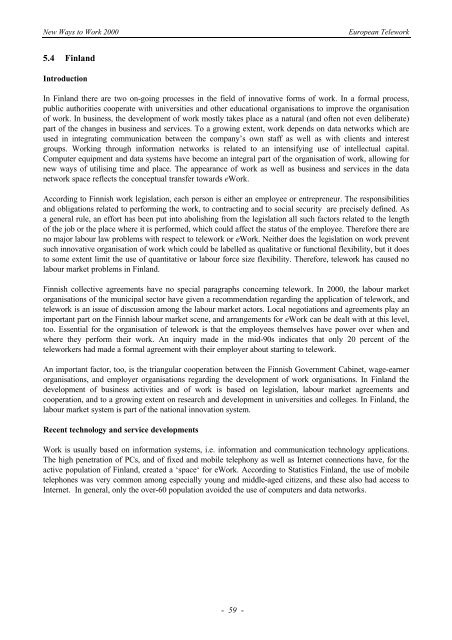eWORK 2000 - European Telework Week
eWORK 2000 - European Telework Week
eWORK 2000 - European Telework Week
- No tags were found...
You also want an ePaper? Increase the reach of your titles
YUMPU automatically turns print PDFs into web optimized ePapers that Google loves.
New Ways to Work <strong>2000</strong><strong>European</strong> <strong>Telework</strong>5.4 FinlandIntroductionIn Finland there are two on-going processes in the field of innovative forms of work. In a formal process,public authorities cooperate with universities and other educational organisations to improve the organisationof work. In business, the development of work mostly takes place as a natural (and often not even deliberate)part of the changes in business and services. To a growing extent, work depends on data networks which areused in integrating communication between the company’s own staff as well as with clients and interestgroups. Working through information networks is related to an intensifying use of intellectual capital.Computer equipment and data systems have become an integral part of the organisation of work, allowing fornew ways of utilising time and place. The appearance of work as well as business and services in the datanetwork space reflects the conceptual transfer towards eWork.According to Finnish work legislation, each person is either an employee or entrepreneur. The responsibilitiesand obligations related to performing the work, to contracting and to social security are precisely defined. Asa general rule, an effort has been put into abolishing from the legislation all such factors related to the lengthof the job or the place where it is performed, which could affect the status of the employee. Therefore there areno major labour law problems with respect to telework or eWork. Neither does the legislation on work preventsuch innovative organisation of work which could be labelled as qualitative or functional flexibility, but it doesto some extent limit the use of quantitative or labour force size flexibility. Therefore, telework has caused nolabour market problems in Finland.Finnish collective agreements have no special paragraphs concerning telework. In <strong>2000</strong>, the labour marketorganisations of the municipal sector have given a recommendation regarding the application of telework, andtelework is an issue of discussion among the labour market actors. Local negotiations and agreements play animportant part on the Finnish labour market scene, and arrangements for eWork can be dealt with at this level,too. Essential for the organisation of telework is that the employees themselves have power over when andwhere they perform their work. An inquiry made in the mid-90s indicates that only 20 percent of theteleworkers had made a formal agreement with their employer about starting to telework.An important factor, too, is the triangular cooperation between the Finnish Government Cabinet, wage-earnerorganisations, and employer organisations regarding the development of work organisations. In Finland thedevelopment of business activities and of work is based on legislation, labour market agreements andcooperation, and to a growing extent on research and development in universities and colleges. In Finland, thelabour market system is part of the national innovation system.Recent technology and service developmentsWork is usually based on information systems, i.e. information and communication technology applications.The high penetration of PCs, and of fixed and mobile telephony as well as Internet connections have, for theactive population of Finland, created a ‘space‘ for eWork. According to Statistics Finland, the use of mobiletelephones was very common among especially young and middle-aged citizens, and these also had access toInternet. In general, only the over-60 population avoided the use of computers and data networks.- 59 -








